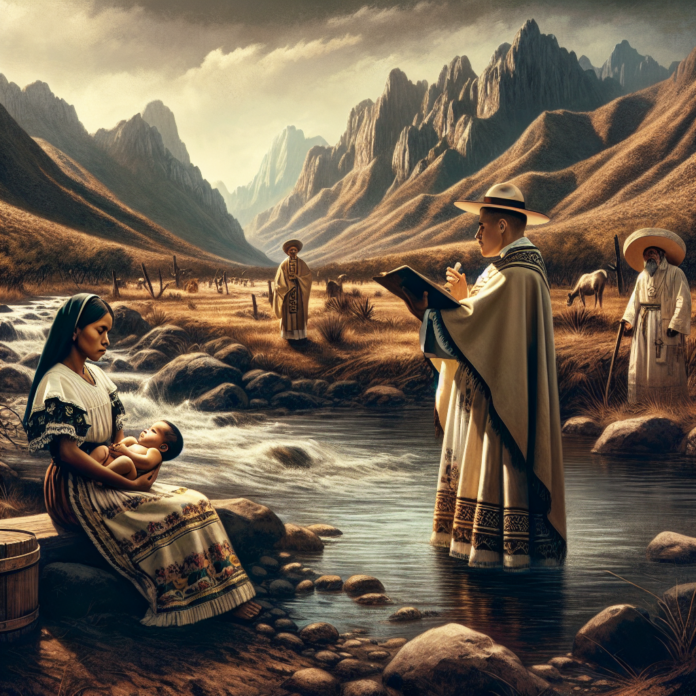Baptism or Death: The Dilemma of Indigenous Mexicans
For centuries, indigenous communities in Mexico have grappled with the challenge of retaining their rich cultural heritages while navigating the aggressive imposition of foreign religious customs. This dichotomy, starkly represented by the choice between baptism or death, encapsulates the broader struggle between traditionalism and progressive values.
Historically, a Union of Force and Faith
The Spanish conquest of the Americas in the 16th century marked a turning point in the lives of indigenous Mexicans. Armed with a thirst for gold and an unyielding zeal for religious conversion, the conquistadors and accompanying missionaries transformed Mesoamerica irreversibly. The indigenous religions, deeply rooted in nature worship, cosmology, and ritualistic traditions, faced brutal suppression. Tragically, the imposed Christian doctrine was not a voluntary offering, but a mandated decree backed by the threat of extermination.
The edict often delivered to indigenous peoples was simple: embrace baptism or face death. Hernán Cortés, along with his contingent of Spanish soldiers and clergy, enacted policies that dismantled temples, outlawed native rituals, and eradicated the gods and practices integral to pre-Columbian existence.
The Torn Fabric of Traditionalism
Traditionalism, while preserving vital aspects of culture and identity, often became an unwelcome conservator of oppressive practices. Indigenous communities were cornered into clinging to their ancient customs, some of which included rigid social hierarchies, ritual sacrifices, and gender disparities. Progress, under such conditions, moved at a glacial pace.
In capturing the essence of tradition, we must recognize both its grandeur and its shackles. The indigenous Mexicans were both enriched and ensnared by their customs. Rituals that tied them to the land, respected the ecological balance, and honored their ancestors were inextricable from ceremonies that, to outsiders, appeared brutal and anachronistic.
Thus, the Spanish imposition of Christianity emerged as a double-edged sword. On one hand, it violently dismantled meaningful cultural practices, but on the other, it offered a gateway to certain progressive values. The Christian doctrine, with its emphasis on compassion, charity, and some semblance of gender equity, provided an alternative set of principles that could be harnessed to challenge some of the entrenched, regressive aspects of traditionalism.
The Struggle for Cultural Syncretism
The inevitable result of such forced cultural collision was syncretism—a blending of indigenous and Spanish traditions. The revered Virgen de Guadalupe, an enduring symbol of Mexican Catholic faith, is a prime example. Her narrative is inextricably tied to Tonantzin, an indigenous earth goddess, embodying a merger of pre-Hispanic and Christian elements.
This blending was not entirely negative. Syncretism enabled the survival of indigenous customs under the guise of Christianity. The austere pressures of forced conversion threw open the pathways to new interpretations and iterations of faith. Indigenous communities began to navigate these imposed beliefs to forge a distinct identity that honored their past while reluctantly accepting certain aspects of the colonial present.
In contemporary Mexico, this syncretism is manifest in various festivals, rituals, and day-to-day practices. However, it is crucial to distinguish between the enriching aspects of cultural fusion and the oppressive undercurrents that facilitated this merging. The ultimate goal should be to cherish authentic native practices while adopting progressive principles that advocate for equality and human dignity.
A New Dawn for Progressivism
Fast forward to modernity, and the indigenous populations of Mexico still face daunting challenges. Marginalization, poverty, and systemic discrimination are rampant. Yet, the value of progressive advocacy becomes increasingly evident. Endeavors to protect and promote indigenous languages, bolster access to education, and improve healthcare are not just lenient humanitarian gestures, but a necessary pivot from an oppressive past.
The winds of change are gradually sweeping through indigenous communities. Younger generations are blending traditional wisdom with contemporary education. Activism that promotes gender equality, LGBTQ+ rights, and environmental sustainability is taking root, merging the reverence of ancestral lands with progressive advocacy.
Consider the pivotal work of indigenous women who are now at the forefront of such movements. They are reviving and preserving their languages, arts, and agricultural practices while pushing for gender equity and political representation. In Chiapas, the emergence of the Zapatista movement, which advocates for indigenous rights and autonomy, typifies an inspiring mosaic of progressivism.
Delicate Balances
Baptism, once an ultimatum of death, now symbolizes broader cultural choices. To partake in Christianity is no longer merely about religious conversion. It is about integrating diverse philosophies that resonate with indigenous wisdom, human rights, and progressive values. Death, in its figurative sense, looms not from the lack of religious conformity but from the potential erasure of indigenous identity and autonomy in the face of contemporary global challenges.
In conclusion, the historical imposition of baptism or death as a binary choice for indigenous Mexicans encapsulates a darker chapter that must be critically explored. Rejecting the extreme conservatism of both colonial Christianity and some aspects of entrenched traditionalism allows for a future that champions flexibility, empathy, and progress. It is through such balanced progression that a vibrant, diverse, and equitable Mexico can arise, respecting its rich past while embracing a just and inclusive future.
